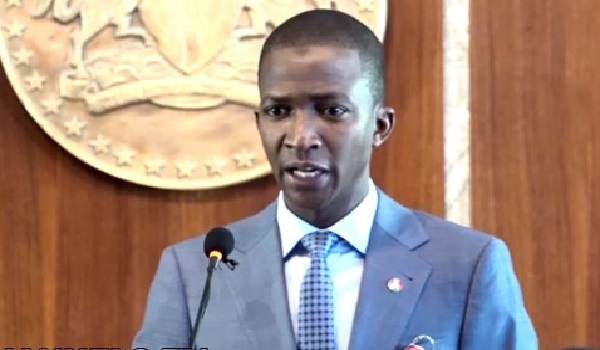National
EFCC, NFIU move to block money laundering, terror financing

Economic and Financial Crimes Commission (EFCC) Chairman Abdulrasheed Bawa and Director, Nigerian Financial Intelligence Unit (NFIU), Modibbo Tukur; West Africa (GIABA), Aba Kimelabalou, have called for enhanced regulation of the nation’s real estate industry.
They argued that such would go a long in curbing the increasing inflow of illicit funds into the sector in Nigeria and other West African nations.
Bawa and Kimelabalou said that it was a thing of concern that the real estate sector had become an avenue for money laundering and terror financing.
They spoke at “the GIABA National Awareness Training on Enhancing Anti-Money Laundering and Counter-Terrorism Financing (AML/CTF) Compliance by Real Estate Practitioners,” in Abuja yesterday.
Bawo, who was represented by his Chief of Staff, Hadiza Zubairu, disclosed that investigation by the EFCC ”identified the real estate sector as a lucrative avenue for the laundering of proceeds from illicit activities by corrupt elements.”
He added that findings by the anti-graft agency were supported by a recent report of the National Risk Assessment of Nigeria which ranked Nigeria’s real estate sector as the second most utilized channel for money laundering.
.Bawa said that the commission has some intelligence that makes it imperative for searchlight to be beamed on the sector in order to make it unattractive to persons deploying illicit funds.
He added that the heavy reliance on cash transactions in the sector was not helping efforts to curtail the activities of money launderers.
His words: ”If I have $100million and I want to spend it today, it can be done through property purchase. Nobody will ask any question and nobody will know anything.”
Pointing out that the opaqueness of transactions in the sector remained a major challenge, Bawa urged participants at the training session to explore the possibility of having a register of beneficial owners of real estate properties in countries in the sub-region.
“I believe such a measure will go a long way in unveiling the secrecy behind real investments in the region,” the EFCC boss said.
Tukur noted that Nigeria has been unable to make meaningful progress in efforts to regulate the industry over the years because of a lack of synergy among the relevant agencies.
He said: “As far as Nigeria is concerned, we are lagging behind seriously in regulating the sector, even some smaller African countries are doing better than us.
“For us to achieve any milestone, we all really have to come together. We cannot continue to work in silos. For us to succeed, we need the support of the EFCC, the Central Bank of Nigeria (CBN) and the Security and Exchange Commission (SEC) to enable us to form a common front,”
Tukur, who was represented by GIABA’s Director, Evaluation and Compliance, Buno Kimelabalou, noted that despite the importance of the sector, studies by the body and the Financial Action Task Force (FATF) show that the real estate is one of the sectors vulnerable to money laundering and terror financing.
“This finding is re-echoed by the National Risk Assessment of Nigeria which ranks the real estate sector as the 2nd most vulnerable to ML risk (medium-high) in the country.”
-

 Politics4 days ago
Politics4 days ago$35M Atlantic Refinery Project: Sunny Goli Commend Tinubu, EFCC over Diligent Prosecution
-

 Politics4 days ago
Politics4 days agoAlleged N101.4 Billion Fraud: Court Orders Service of Hearing Notice on Yahaya Bello
-

 Politics4 days ago
Politics4 days agoConfusion As Court Adjourns Appeals On Rivers State Political Crisis, Orders PDP To Clarify Legal Representation
-

 Politics4 days ago
Politics4 days agoEdo State Govt Bans Activities Of Drivers On Wheels And Road Transport Employees Association Of Nigeria (RTEAN).
-

 News4 days ago
News4 days agoKAI demolishes 138 Shanties, dislodges 169 illegal residents in Lagos
-

 Politics7 days ago
Politics7 days agoAppeal Court President Sets Up Special Panel to Address Rivers State Political Crisis
-

 News4 days ago
News4 days agoPolice Cracks Down Criminal Syndicates, Apprehend 82 suspects in Kano
-

 National4 days ago
National4 days agoTinubu Approved the Appointment of Daniel Bwala, Atiku’s Former Aide, Media Adviser
















